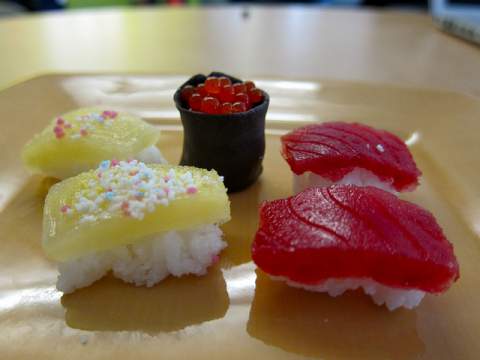Here’s an interesting article on artificial food coloring and list of food additives to avoid.

Approximately there are 300 chemicals used in foods and an average American spends 90 percent of his food budget on such items. Unfortunately no one tried to think about their nutritional benefit.
Colors used on processed foods entice, but not all of them are safe for you. Food additives can’t enhance nutritional value of the food. Only reason why they are used is for the natural flavor, which you expect.
Though few food products claim to incorporate natural additives, they often included with chemical ingredients. To reap nutrients in the plant, one must consume it in its bio-available nutrient complexity.
What are Food Additives?
These are chemical substances incorporated in food products to preserve flavor, improve taste and for delicious appearance. Food manufacturing industries use FDA approved artificial food colors.
Most of them are derived from unhealthy sources like coal tar and petroleum by-products.
Other than this, there natural food colors, but as they are mixed with chemical preservatives, it can turn unhealthy.
List of Top 10 Food Additives to Avoid
#1 Common Food Dyes
AFCs like red dye, blue dye and yellow dye are marked safe by FDA, but there are few cases where these food dyes triggered allergic reaction in kids and adults. Norway, Finland and France banned Blue #1 and Blue #2 after detecting possible chromosomal damage. Red dye 40 is known to cause thyroid cancer and chromosomal damage in animals. Norway and Sweden banned Yellow #6 and Yellow Tartrazine, because it may increase kidney and adrenal gland tumor.
#2 Artificial Sweeteners
Do you love sugar free products, be aware they contain Aspartame (E951), which can trigger adverse reaction than any other food additives. This is often included in products labeled diet and sugar free. It can affect your brain memory and lead to various ailments like brain tumor, lymphoma, diabetes, headaches, nausea, mental confusion, migraine and dizziness.
#3 Trans Fat
This food additive is found in deep-fried fast foods and processed foods. Trans fat is made from margarine and vegetable oils through hydrogenation process. Studies state that this particular additive increase bad cholesterol and decrease food cholesterol in the body leading to heart attack, diabetes and other health issues. Danish market banned the food products that exceed Trans fat more than 2 percent.
#4 Sodium Sulfite
According to FDA 1 in 100 people are hypersensitive to sulfites. Symptoms include headache, rashes, difficulty in breathing, swelling of airways and anaphylaxis. Wine and dried foods include E221 or sodium sulfite.
#5 Sodium Nitrate
Food manufactures use sodium nitrate in meat to make it look fresh and red. Often it is included in hot dogs, bacon, ham, corned beef, smoked fish and luncheon meats. In 1970s USDA tried to ban this food additive, because when it enters digestive system varieties of nitrosamine compounds are formed, which enter blood stream and damage liver.
#6 High Fructose Corn Syrup
This artificial sweetener is included in almost all processed foods like breads, candy, flavored yogurt, salads, dressings, cereals and canned vegetables. This additives increases bad cholesterol and result in diabetes.
#7 BHA and BHT (E320)
These two chemical additives are used in potato chips, candy, jello, chewing gums, cereals and in vegetable oils to preserve color and flavor. They effect neurological system in brain and form cancer causing compounds in body.
#8 Potassium Bromate
It is often used in breads and white flour to increase the volume. Studies state that even small amounts of it can cause cancer.
#9 Sulfur Dioxide (E220)
This toxic substance in forbidden by FDA from using it on raw fruits and vegetables, it can result in adverse reaction with asthma, tingling sensation, low blood pressure and anaphylaxis. Normally found in beer, soft drinks, dried fruits, wine, vinegar and cordials.
#10 Monosodium Glutamate
It’s an amino acid used to preserve and enhance flavor in salad dressings, chips, restaurant foods and frozen entities. E621 or Monosodium glutamate results in depression, eye damage, fatigue, headache and obesity. Chinese foods, cookies, lunch meats and soup products include this additive.
Apart from this there are more food additives to avoid for healthy functioning. Studies show that these food additives have significant effect on behavior of children and may affect their IQ.

